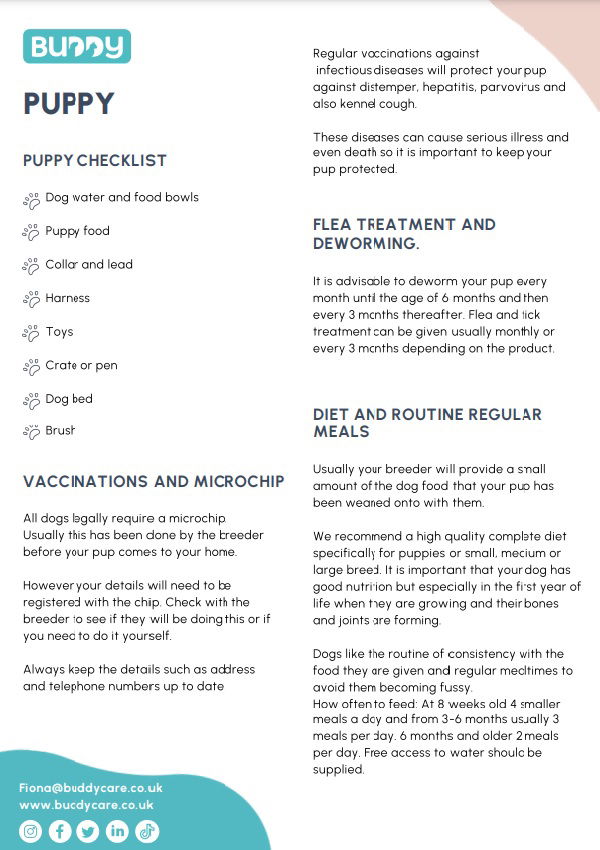New puppy checklist and information

Are you getting a puppy? Getting a puppy is a really joyful moment, but there are many things to consider beforehand. Read our guide to get ready for your new addition.
New puppy checklist
- Water and food bowls
- Puppy food
- Collar and lead
- Harness
- Toys
- Crate or pen
- Dog bed
- Brush
Vaccinations and microchip
All dogs legally require a microchip. Usually this has been done by the breeder before your pup comes to your home.
However your details will need to be registered with the chip. Check with the breeder to see if they will be doing this or if you need to do it yourself.
Always keep the details such as address and telephone numbers up to date.
Regular vaccinations against infectious diseases will protect your pup against distemper, hepatitis, parvovirus and also kennel cough.
These diseases can cause serious illness and even death so it is important to keep your pup protected.
Flea treatment and deworming
It is advisable to deworm your pup every month until the age of 6 months and then every 3 months thereafter. Flea and tick treatment can be given usually monthly or every 3 months depending on the product.
Diet and routine regular meals
Usually your breeder will provide a small amount of the dog food that your pup has been weaned onto with them.
We recommend a high quality complete diet specifically for puppies or small, medium or large breed. It is important that your dog has good nutrition but especially in the first year of life when they are growing and their bones and joints are forming.
Dogs like the routine of consistency with the food they are given and regular mealtimes to avoid them becoming fussy. How often to feed: At 8 weeks old 4 smaller meals a day and from 3-6 months usually 3 meals per day. 6 months and older 2 meals per day. Free access to water should be supplied.
Toilet training
You will soon settle into a routine and learn when your pup is wanting to wee and poo. The more effort you can put into toilet training the quicker your pup will learn.
As soon as they wake up, have eaten, had a play session and pretty much every hour give them opportunity (in the garden on take onto the puppy pad) to toilet.
A command word can also help them understand and learn what they need to be doing.
Everytime they toilet in the correct place give them lots of positive praise and fuss.
If your pup is food orientated a little treat or small bit of their usual food can also work well.
Overnight your pup will not be able to hold their bladder so will either soil where they are sleeping or ask to be let out to toilet in the night.
Providing a save place for rest / crate training
Either crate training or having an area for your pup to retreat to sleep helps them have a space they can go to rest in peace and quiet
They also can start to have a little independence to prepare them for being left on their own for short periods and gain confidence.
Making the crate or area nice and comfortable with a comfy bed, blankets over to create a cozy retreat, with some toys, access to water etc
Encourage your pup to go into this area with treats, or placing them into the area when they are ready for a sleep.
They will soon learn this is a quiet place they can go to on their own. Always make this a positive experience and give plenty of praise and encouragement.

 New dog informationAre you adopting a dog? One of the best things you can do is rescue an dog. However, it's crucial to keep in mind that every new best buddy has a unique tale to tell.
New dog informationAre you adopting a dog? One of the best things you can do is rescue an dog. However, it's crucial to keep in mind that every new best buddy has a unique tale to tell. Pet scams: How to protect yourself?This article will talk about the sneaky nature of pet scams and offer advice on how to stay safe from falling victim.
Pet scams: How to protect yourself?This article will talk about the sneaky nature of pet scams and offer advice on how to stay safe from falling victim. Cat leash trainingAlthough cats aren't as accustomed to walking on a leash as dogs are, many may be trained to enjoy leash walks and enjoy outdoors with the correct training and patience.
Cat leash trainingAlthough cats aren't as accustomed to walking on a leash as dogs are, many may be trained to enjoy leash walks and enjoy outdoors with the correct training and patience.